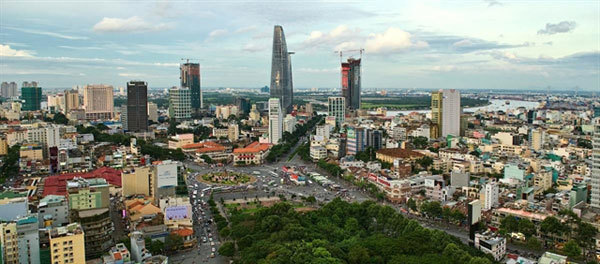 |
| A view of HCM City. Local authorities have said that achieving greater satisfaction among residents and businesses is a top priority. Photo courtesy of HCM City Department of Home Affairs |
Speaking at an online meeting about the city’s Provincial Governance and Public Administration Performance Index (PAPI), Ngo Minh Chau, vice chairman of the city’s People’s Committee, said that advanced technology would be used to improve governance and public administration. The city aims to be in the top 10 provinces and cities with the highest PAPI, he noted.
“The city’s Department of Home Affairs will consult the city administration on ways to improve PAPI, using the satisfaction of people and businesses as a measure of work efficiency,” according to Chau.
Dr. Pham Duy Nghia, associate professor at Fulbright University of Vietnam, said that, to achieve a high PAPI, localities need to have “great and inspiring leaders”.
Dr Catherine Phuong, assistant resident representative of the Governance and Participation at United Nations Development Programs (UNDP) Vietnam, said the city should continue its fight against the COVID-19 pandemic amid its governance plans.
“The PAPI index is designed to improve the quality of public service and improve public satisfaction about the implementation of policies and laws,” she said.
Dao Gia Vuong, vice chairman of District 7 People’s Committee, said District 7 authorities had shortened administrative time from 15 days to 12 days for granting construction permits.
In the first half of the year, only seven applications in the district for individual construction permits out of 920 applications were delayed because the applications lacked updated information or were inconsistent with construction planning.
HCM City was among 16 cities and provinces recording a high average PAPI in 2019, with six higher indexes: public participation at the grassroots level, transparency, accountability and responsibility towards the public, corruption control, public administrative procedures, public service supply, and e-governance.
According to a survey last year, 92 per cent of respondents said they were satisfied with the behaviour of civil servants at the municipal Department of Planning and Investment, while the rate for the municipal Department of Construction, the people’s committees of District 1, District 12 and Hoc Mon District were 93 per cent, 92 per cent, 91 per cent, and 83 per cent, respectively.
The rate of those who were not satisfied with the handling of public administrative procedures in the Department of Planning and Investment, the Department of Construction and the People’s Committee of District 1 was between 4-10 per cent.
Meanwhile, the dissatisfaction rate for the people’s committees of District 12 and Hoc Mon District were 12 per cent and 25 per cent, respectively.
The survey was carried out by five city agencies through 1,200 questionnaires collected from a list of people and organisations that completed their administrative processing requests in the first quarter of 2018.
Under a Government resolution on the reduction and simplification of provisions related to business activities during the 2020-25 period, Vietnam aims to cut or simplify 20 per cent of regulations and 20 per cent of costs related to business activities by 2025.
PAPI is a flagship governance programme initiated by UNDP Vietnam in 2009. PAPI measures and benchmarks citizens’ experiences and perception of the performance and quality of policy implementation and services delivery of all 63 provincial governments in Vietnam in an effort to support effective and responsive governance. VNS

First Vietnamese city announces digital transformation programme
On July 22, Ho Chi Minh City has become the first city in Vietnam to announce a digital transformation programme.

Australia and UNDP renew partnership on PAPI programme
A total of AUD$9.7 million (US$6.7 million) has been funded by Australia’s Department for Foreign Affairs and Trade (DFAT) for the ongoing “Vietnam Provincial Governance and Public Administration Performance Index” (PAPI) programme
 HCM City views “greater satisfaction of residents and businesses as a top priority” as part of its effort to ensure better governance and public administration, a city official said yesterday.
HCM City views “greater satisfaction of residents and businesses as a top priority” as part of its effort to ensure better governance and public administration, a city official said yesterday.